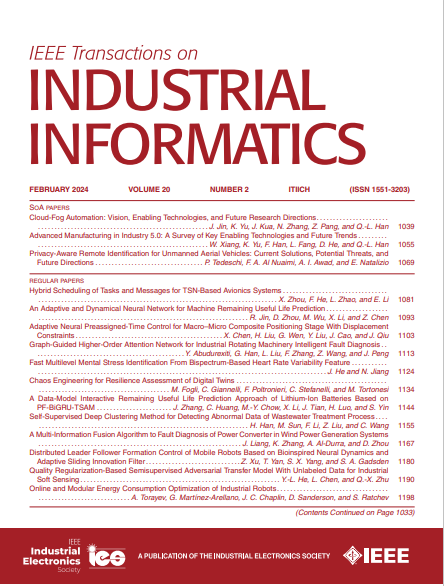污水处理过程中硝化多源信息的多空间尺度最优控制
IF 11.7
1区 计算机科学
Q1 AUTOMATION & CONTROL SYSTEMS
引用次数: 0
摘要
污水处理过程中不可避免地会出现进水污染物负荷的剧烈波动,这使得硝化难以以最小的努力调节溶解氧浓度以保证出水水质。为了解决这一问题,本文提出了一种多空间尺度多源信息最优控制方法(MSI-MSSOC)。首先,利用机理知识和工艺数据构建多空间尺度优化模型,构建合理的目标和约束条件;然后,描述性能指标,评价不同地区溶解氧浓度的综合调节效果。其次,采用自适应知识获取策略提取可行和不可行方案之间的交互性。然后,所提出的策略可以辅助最优控制寻找最优解。第三,引入知识辅助优化算法更新可行域,计算最优解;从而获得不同区域的最佳溶解氧浓度,保证出水水质,降低能耗。最后,将所提出的MSI-MSSOC应用于1号基准仿真模型,验证了其有效性。实验结果表明,MSI-MSSOC能达到理想的硝化操作性能。本文章由计算机程序翻译,如有差异,请以英文原文为准。
Multispatial-Scale Optimal Control With Multisource Information for Nitrification in Wastewater Treatment Process
The drastic fluctuations of influent pollutant load are inevitable in wastewater treatment process, which makes it difficult for nitrification to regulate dissolved oxygen concentrations with minimal effort to ensure the effluent quality. To solve this problem, a multispatial-scale optimal control with multisource information (MSI-MSSOC) is developed in this article. First, a multispatial-scale optimization model, making use of mechanism knowledge and process data, is designed to construct reasonable objectives and constraints. Then, the performance indexes can be described to evaluate the comprehensive adjustment effect of dissolved oxygen concentrations in different areas. Second, an adaptive knowledge acquisition strategy is employed to extract the interactivity between feasible and infeasible solutions. Then, the proposed strategy can assist in the optimal control to search for the optimal solutions. Third, a knowledge-aided optimization algorithm is introduced to update the feasible region to calculate the optimal solutions. Then, the optimal dissolved oxygen concentrations in different areas can be obtained to guarantee the effluent quality and reduce the energy consumption. Finally, the proposed MSI-MSSOC is applied to Benchmark Simulation Model No. 1 to verify its effectiveness. The experimental results demonstrate that MSI-MSSOC can achieve the desirable operation performance of nitrification.
求助全文
通过发布文献求助,成功后即可免费获取论文全文。
去求助
来源期刊

IEEE Transactions on Industrial Informatics
工程技术-工程:工业
CiteScore
24.10
自引率
8.90%
发文量
1202
审稿时长
5.1 months
期刊介绍:
The IEEE Transactions on Industrial Informatics is a multidisciplinary journal dedicated to publishing technical papers that connect theory with practical applications of informatics in industrial settings. It focuses on the utilization of information in intelligent, distributed, and agile industrial automation and control systems. The scope includes topics such as knowledge-based and AI-enhanced automation, intelligent computer control systems, flexible and collaborative manufacturing, industrial informatics in software-defined vehicles and robotics, computer vision, industrial cyber-physical and industrial IoT systems, real-time and networked embedded systems, security in industrial processes, industrial communications, systems interoperability, and human-machine interaction.
 求助内容:
求助内容: 应助结果提醒方式:
应助结果提醒方式:


